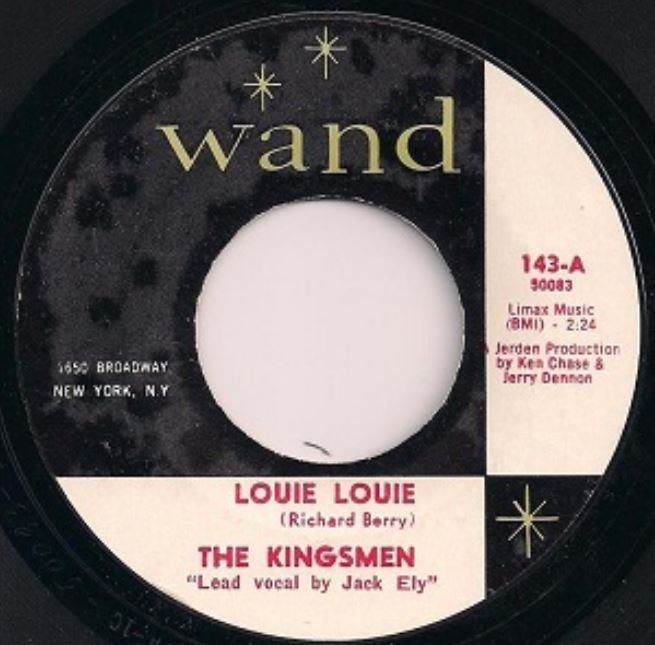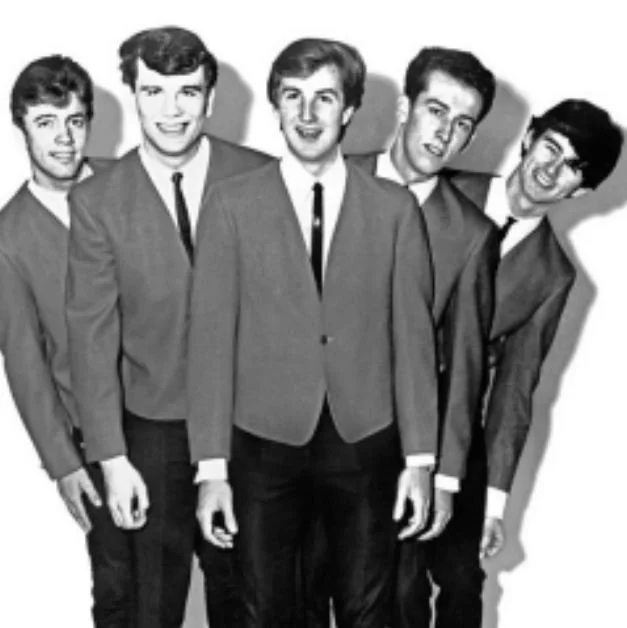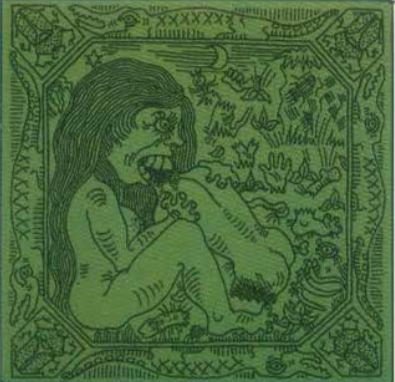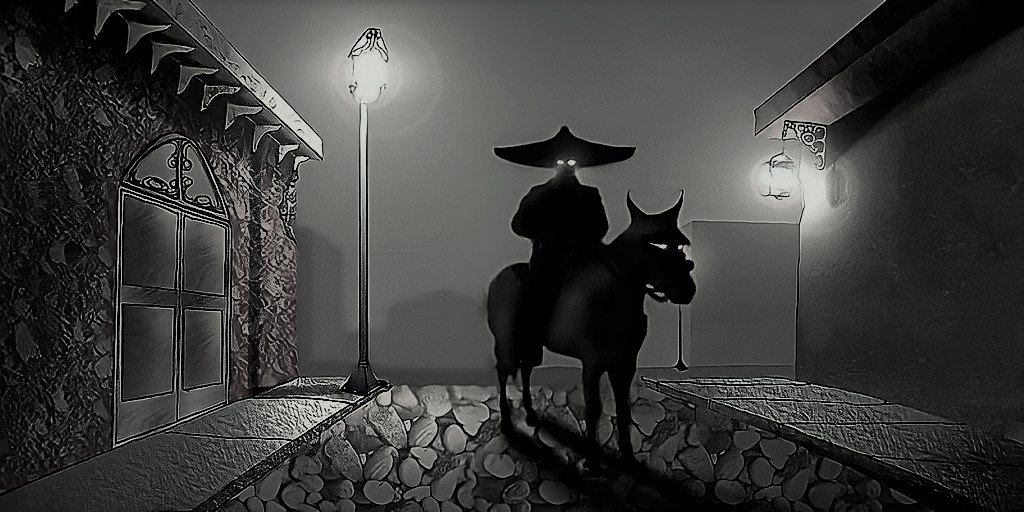Louie Louie: The Hit Song Investigated by the FBI
When Richard Berry composed and wrote “Louie Louie” in the late 1950s, he never imagined it would eventually be considered one of the most influential rock songs of all time.
In the last 60 years, “Louie Louie” has been covered over 1600 times, has been featured in dozens of movies, has had festivals; parades; and street parties dedicated to it, and has been included in Rolling Stone's list of The 500 Greatest Songs of All Time.
But it was the 1963 cover by the rock band, The Kingsmen, that propelled the song into the national spotlight, and because of some ridiculous pearl-clutching from parents compounded with a bunch of lies, the FBI had to get involved.
So grab your pearls because here’s the song:
The Kingsmen’s Intro
As “Louie Louie” performed by Richard Berry was becoming a regional hit in California in 1957, high schoolers Lynn Easton and Jack Ely were creating their rock band, The Kingsmen, in Portland, Oregon. By 1962, lead singer Jack and drummer Lynn, added Mike Mitchell on guitar, Bob Nordby on bass, and Don Gallucci on the keyboard.
In 1963, the group became the house band for a teen club called “The Chase” owned by Ken Chase, host of KISN radio. During one of their gigs, the band heard a version of “Louie Louie” covered by singer “Rockin’ Robin” Roberts, and Jack thought the Kingsmen should record their own version.
Since you’ve read the opening paragraphs of this article you already know they did. But, it was a rushed recording, done in one take, and due to the setup of the studio; Jack Ely had to stand on his toes to sing into the microphone. In an interview years later, he stated it was more yelling than singing because of the close proximity of the instruments.
The Kingsmen wanted to re-record the song but Ken Chase, who was now also their manager, advised against it. It’s a good thing too because the song quickly became a hit and multiple record labels like Decca, Mercury, and Columbia all wanted a piece. In the end, the Wand Record Company in New York City purchased the Kingsmen version.
As the popularity of the song increased, radio stations started to get calls from concerned parents who thought the lyrics were not only obscene but pornographic. Parents feared the song would cause the United States to fall into “an extreme state of moral degradation”. Someone actually wrote that… in a letter! To the Attorney General of The United States! About these guys:
Look at them, oozing that raw sexual pornographic energy that could degrade a country
A Chorus of Bans
So you’re probably wondering if the song actually contained pornographic or obscene lyrics, it didn’t but people sure thought it did. If you listened to the song, you’ve most likely realized that among the music someone is singing, what you probably didn’t realize is that those are actual words.
Due to Jack yelling, standing on his toes, having to lean his head back, and his braces, the words sound slurred, garbled, and are hard to make out. In January 1964, two teens at Frankfort High School in Indiana got a hold of the “lyrics” and were shocked to discover they were dirty.
If you’re wondering why lyrics is in quotes in the above paragraph, it’s because the “lyrics” the teens received were fake. Here are the real lyrics versus the fake lyrics, keep in mind when the Kingsmen recorded their cover, they stuck to the original lyrics as written by Richard Berry.
Richard Berry’s Lyrics
Look at this fuckery…
But the teens didn’t know this and acting quickly to preserve the nation, they wrote a letter to Indiana Governor Matthew Welsh complaining about the song. Governor Welsh was outraged, he purchased the record, and listened to it but couldn’t make out any of the lyrics.
He then played it at a slower speed and still couldn’t make out the lyrics. Did he next do the logical thing and ask Wand Records for the actual lyrics?
Don’t be ridiculous, he just banned the song for containing pornographic lyrics. Meanwhile, KEEL radio station in Shreveport, Louisiana, the largest radio station there, also received various complaints regarding the song and banned it as well. Except they did request the lyrics from Wand Records. Once they got it and verified no obscenities, they lifted the ban.
The publicity of the bans ended up having the opposite effect as usual, and demand for “Louie Louie” increased. But, with this came more complaints… all over the country. The best part is that most of these complaints read more like urban legends than actual concerns.
Many parents admitted they couldn’t make out the “obscene lyrics” but they knew they were there, others said that kids were passing around the (fake) lyrics at schools claiming that those were the secret underground lyrics, and others said they definitely could hear the obscene lyrics but only if you played the record at 33 ⅓ speed.
Finally, some complaints said that if you closed your eyes and repeated the (fake) lyrics into a mirror three times, you’d open them to see an idiot. I made that last one up but somehow it's the truest one.
The Federal Communications Commission (FCC) and the National Association of Broadcasters (NAB) looked into the complaints. By the end of February, the FCC dropped the investigation and NAB found “nothing objectionable” but they also got their hands on the fake lyrics and added:
“The phonetic qualities of this recording are such that a listener possessing the ‘phony’ lyrics could imagine them to be genuine.”
“Look, I imagined the money in my account, it’s definitely there!”
While several organizations used logic, only banning the song temporarily, and others said “fuck that” to logic because of imagined obscenities, an issue arose. Several Assistant United States Attorneys wondered if they could bring charges against Wand Records and The Kingsmen under the “Importation or Transportation of Obscene Matters” (ITOM) act.
At the time this law was still in its infancy so it had a lot of problems. The law basically said you couldn’t transport obscene material but who decides what’s obscene? How is it determined? Governor Matthew Welsh might consider anyone speaking another language obscene instead of asking for a translator.
To figure this out, the Department of Justice put the Federal Bureau of Investigation (FBI) on the case. In February of 1964, the FBI opened several investigations in several states to find out if “Louie Louie” was actually obscene.
The Refrain ft. The FBI
A lot of the sources I read say the FBI conducted a 31-month long investigation to determine if the song was obscene that ended up with them stating they were “unable to interpret any of the wording in the record.”
As funny and believable as that is, that’s not actually true. See, under the Freedom of Information Act, the FBI has the full 119-page investigation freely available on the government website. After going through the 119 pages, it turns out that initially the FBI only investigated the claims from February 1964 to May 1964.
FBI offices in Florida, California, and Indiana opened up investigations in February, but they weren’t just looking to see if the lyrics were obscene, they had to determine if someone else was selling fake copies with actual obscene lyrics in the state. So it was a bit more complicated than just listening to the record.
By May 1964, all three offices dropped their investigations citing not only that they “could not clearly interpret” the lyrics but also stated, “there is no apparent Federal violation involving the obscene lyrics.” Case closed… or so they thought.
“I can’t listen to that damn song again!”
Unfortunately, the complaints kept coming in and a year later at the end of May, Assistant United States Attorney Robert J. Grace from Michigan, reached out to the FBI to look into the song again. He was informed that all FBI offices that looked into the song previously, now including New York, couldn’t definitively determine obscene lyrics but all declined to prosecute.
This wasn’t enough for Mr. Grace. He contacted the New York FBI office and put pressure on them to reach out to Wand Records in New York. He wanted them to investigate the original recording to ensure there were no shenanigans.
Maybe Grace felt he could put the pressure on the FBI because it was around this time that J. Edgar Hoover, Director of the FBI, received a very concerned letter from an unnamed member (FBI blacked out all names in their report) of the “General Federation of Women’s Clubs” regarding the song.
The pearl-clutching in this letter included gems like speaking to a lawyer, escalating the matter when they weren’t happy with the answer of “nothing obscene found”, and implying the song has led to an “alarming” rise in venereal disease, perversion, promiscuity, and illegitimate births among teens. Basically, the letter read like a Twitter Karen’s training packet.
“I rolled my eyes so much, they’re now stuck.”
I don’t know how fast you or I could get a response from the Director of the FBI today, but Hoover responded within a week! I guess they caught him on one of those rare weeks where he wasn’t abusing his power by blackmailing, threatening, or spying on people.
In his response, Hoover stated he couldn’t comment on an ongoing investigation but ensured the FBI was making “every effort” to investigate. So when the Director of the FBI says they’re doing what they can, that New York field office is going to have to actually, thoroughly, investigate “Louie Louie” and get a concrete answer.
In August of 1965, agents went to Wand Records in New York City and made a copy of the original recording on the spot while they oversaw the process. Just to be extremely thorough, the New York office sent the copy to the FBI lab to compare it to the record Robert Grace received and ensure it was the same song. That took another month to verify, labs are busy.
In the meantime, the FBI interviewed most of the band and others related to the recording of the song. They also found out the fake lyrics were most likely written by a college student who claimed they were the real lyrics, you know, like a liar.
In late November 1965, the FBI office in Detroit sent their findings to Robert Grace which stated that based on the findings of the lab, “the song… did not contain any obscenity.”
Whaaaaa? No way!
A few days later, now December, A.US.A Robert Grace closed the last open investigation on the definitely not obscene “Louie Louie” and stated there was “no evidence of an ITOM violation and… recommending that no further investigation be conducted.”
At this point, every FBI office and teenager in the United States, presumably said, “No shit.”
The Outro
In total, the FBI investigated “Louie Louie” for a combined 10 months, if for some reason, you count the months in between both investigations, that would be 22 months. But under that logic, I can confidently tell my doctor that I’ve been going to the gym for 10 years.
There was one final page in the FBI report dated October 1966 where Wand Recording makes a request for the FBI to return the copy they made and the FBI complied. I’m assuming when articles say it was a 31-month long investigation, they’re counting that time as well, which again… why?
As for the Kingsman, they actually broke up before the song became popular. Jack Ely was pushed out of the group by Lynn Easton. When the song became a hit, Lynn would lip-synch to Jack’s recording when they performed live.
“Anyone else feel something sharp in their back?” - Jack Ely probably
After starting a new The Kingsmen band, Jack was sued by Lynn since Lynn owned the name. In the settlement, Jack retained the rights to the popular recording of Louie Louie including royalties but Lynn got to keep The Kingsmen name, though he was no longer allowed to lip-synch the song.
The Kingsmen are still around today albeit with different members as the original band members have all passed away.
As for the man who started it all, Richard Berry, even though Louie Louie became extremely popular because of the Kingsmen, Berry received no royalties for it. While the record companies were making millions off of “Louie Louie”, Berry originally sold the rights to the song for $750 (around $7,600 in 2022 money). In an interview in 1993 Berry said;
"Everybody sold their songs in those days. I never was bitter with the record companies. They provided a vehicle for five young black dudes to make a record.”
For those angry at Berry’s situation and currently using obscene language that would have you investigated for 10-31 months by the FBI, there is good news. In the mid-1980s a company looking to use Berry’s original version of the song asked the Artists’ Rights Society to find him.
They eventually found him living at his mother’s house broke and on welfare in South Central, Los Angeles. A lawyer for the society offered to help Berry get a little something from publishers for the song.
Though Berry said he didn’t “want to cause trouble” his mother and his daughter pushed him to agree. Months later, the publishers settled out of court and Richard Berry became a millionaire.
Quick Facts
Though the song title is sometimes written with a comma “Louie, Louie”, Richard Berry confirmed in an interview that the correct title has no comma
Even though J. Edgar Hoover responded to the General Federation of Women’s Clubs' letter within a week; they didn’t respond back for almost a month, that’s a power move.
No one knows who created the fake lyrics or in what college they first originated but the same lyrics showed up in multiple states over the years

















